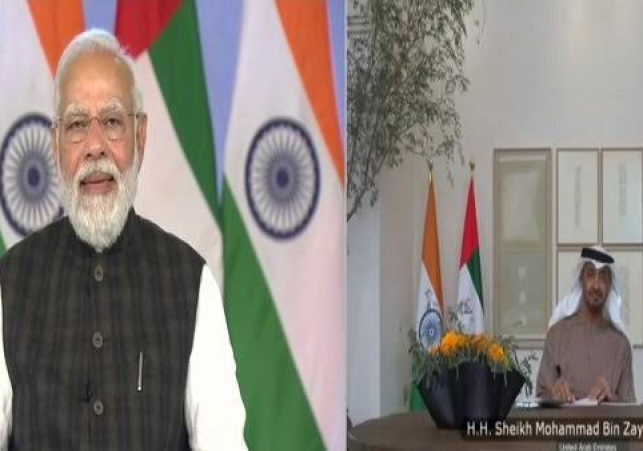

India and the United Arab Emirates (UAE) have inked a trade agreement that will decrease import levies on the majority of Indian exports to the UAE. The Comprehensive Economic Partnership Agreement (CEPA) is the Narendra Modi government's first significant trade agreement after taking office in 2014.
Commerce and Industry Minister Piyush Goyal and UAE Economy Minister Abdulla bin Touq Al Marri signed the agreement in New Delhi. While the government anticipates the reduction in import levies to benefit a wide range of products, the government expects it to stimulate exports of gems and jewellery, as well as clothes, to the UAE, bringing overall commerce to $100 billion in the next five years.
After the United States and China, the UAE is India's third-largest trading partner in the world. As of 2020-21, bilateral trade between the two countries totaled $43.3 billion, with thousands of items transferred. Trade between the two nations was anticipated to be $59 billion in the pre-pandemic year of 2019-20. 35 lakh people of Indian ancestry live in the UAE.
The CEPA is scheduled to take effect in the first week of May, according to Goyal, because the process will take roughly 60 days. During that time, a series of business encounters involving enterprises from both sides will take place across India.
Many firsts
According to Goyal, the 880-page paper includes themes including free trade, digital economy, government procurement, and critical areas. According to him, the transaction will benefit over 90% of all traded items.
Exports of gems and jewellery, textiles, leather, footwear, sports goods, plastics, furniture, agro goods, pharma, medical devices, autos, and engineering goods are expected to profit from the agreement. "Most of these sectors are labor-intensive, and we anticipate that if our bilateral trade grows to $100 billion, at least 10 lakh jobs for youth would be created," Goyal added.
India has made tariff concessions to the UAE on gold exports, while eliminating levies on jewellery exports from India.
"For the first time, the UAE has graciously accepted our request that, once an Indian medical product has been accepted by the United Kingdom, the United States, the European Union, Canada, and Australia, and has gone through their rigorous regulatory processes, such products will be granted market access and regulatory approval in a time-bound manner of 90 days for marketing in the UAE," Goyal said.
He stated that both countries' industries will be protected from any abrupt increases in product volume through a permanent safety mechanism.
While it is actively negotiating trade agreements with as many as eight countries, the pact with India is crucial for the UAE's economic and strategic interests. "The forecasts are unmistakable. It will boost our national GDP by 1.7 percent, or $8.9 billion. Exports will increase by 1.5 percent "Touq Al Mari expressed his thoughts.
According to Goyal, the UAE is projected to gain from increased exports of metals and minerals, petrochemicals, petroleum products, and dates.
Top-level push
On Friday, Prime Minister Narendra Modi and Deputy Supreme Commander of the United Arab Emirates (UAE) Armed Forces and Crown Prince of Abu Dhabi, Sheikh Mohamed bin Zayed al Nahyan, conducted a virtual summit between India and the UAE.
"I am certain that this will usher in a new era of economic cooperation and progress," Modi remarked.
The transaction was officially launched in September 2021, and negotiations were finished in a record speed of just 88 days. The new agreement is a "early harvest" component of a future trade and economic partnership agreement that will be substantially more comprehensive. A trade agreement for early harvest is one in which both sides agree to a set of relatively simple deliverables.
Moneycontrol had claimed that discussions were nearly complete, and that Modi expected to sign the agreement during his next visit to the UAE and Kuwait in early January.
Goyal, on the other hand, highlighted that the accord is not a "interim agreement" or "arrangement," but rather a fully legalised agreement that protects both countries' trade and strategic interests.
Also read : Rakesh Gangwal, co-founder of IndiGo, stepped down from board